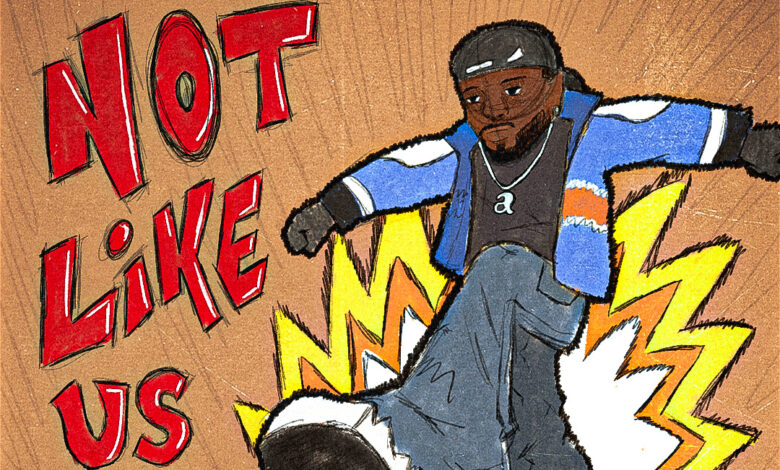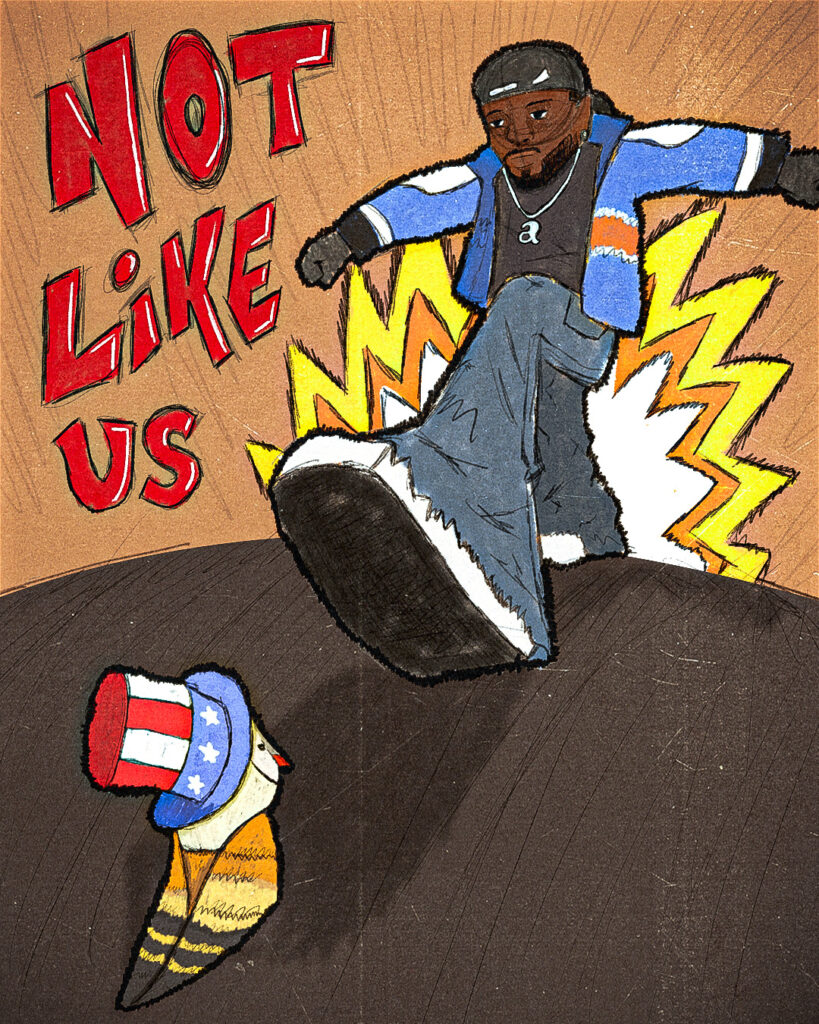
Lamar makes up for lack of flair with potent message
By Jake Tiger
Like the Philadelphia Eagles defense, Kendrick Lamar, fresh off five Grammy Award wins and perhaps the biggest year of his storied rap career, dished out hit after hit at Super Bowl LIX, none more anticipated than the head-bobbing, provocative anthem that is “Not Like Us.”
What many may not have expected, however, was the unapologetic political throughline that powered the 13-minute performance, from Samuel L. Jackson suiting up as Uncle Sam to the on-stage imagery of a fractured nation.
Lamar’s set, the first halftime show headlined by a solo rapper, was not the most complicated or vocally impressive performance the Super Bowl has seen, but what it lacked in spectacle was filled in by Lamar’s clear, direct message about the state of America and Black culture as a controversial administration steps into power.
The vehicle for Lamar’s expression was an ambiguous game put on by Jackson’s portrayal of Uncle Sam, passing judgement and deducting a “life” from Lamar when he did not follow the rules, of which the impassioned rapper often ignored.
As a whole, 2025’s halftime show marked a departure from the high-flying production fans had grown accustomed to. There were no costume changes or surprise musical guests and the stages were simple. The focus was on Lamar — and SZA for two short, glorious minutes.
The show began with dozens of dancers; donning red, white and blue; spewing out of a black Acura GNX while Lamar, perched on the car’s hood, made a declaration addressed to his audience of millions: “The revolution ’bout to be televised. You picked the right time but the wrong guy.”
It is unclear who exactly the “wrong guy” is, as it could have two meanings. It could be Lamar, who used his massive platform to televise a political statement, or President Donald Trump, who was reelected in November and attended the game, becoming the first sitting president to do so.

Illustration by Josiah Thomas/The Rider News
After Lamar’s first song, “Squabble Up,” Uncle Sam butted in and called it “too loud, too reckless, too ghetto.” But, the next track was even more boisterous. The dancers organized themselves into an American flag that Lamar bisected down the middle whilst performing the hard-hitting “Humble.”
Later in the show, Uncle Sam chimed in after things slowed down during Lamar and SZA’s largely apolitical duets of “Luther” and “All the Stars.” He said, “That’s what America wants, nice and calm,” before being interrupted by the punchy, unmistakable horns of “Not Like Us.”
Super Bowl LIX was the first NFL game since 2020 to not have the phrase “End Racism” painted on the field’s endzones, instead opting for “Choose Love.” The decision came at a time when other organizations began cutting on diversity efforts after Trump signed an executive order Jan. 21 that sought to end hiring practices and other opportunities driven by diversity, equity and inclusion.
Given the climate of American politics and his recent spat with rapper Drake, who Lamar calls a “colonizer” of Black culture in “Not Like Us,” the rapper has often vocalized how he feels living in America in 2025. On the Super Bowl’s stage, Lamar preceded his climactic rendition of “Not Like Us” by saying, “Forty acres and a mule, this is bigger than the music./They tried to rig the game, but you can’t fake influence.”
While America buried itself in the big game, a powerful phrase was being scrubbed from the endzones. While fans were taking sides in the battle between the Chiefs and Eagles, Lamar used his time to draw attention to the more important rift dividing the country.
Lamar brought something different to the Super Bowl, and it is hard to recall a show that was as risky, proud and uncompromising.
The production was not as elaborate as The Weeknd’s in 2021, and the performance was not as soul-wrenching as Prince’s in 2007, but Lamar, at the apex of culture, used his knack for politically potent messaging to strike a chord that resonated with America, and that is much more than a minor achievement.
Jake Tiger is a senior journalism major



